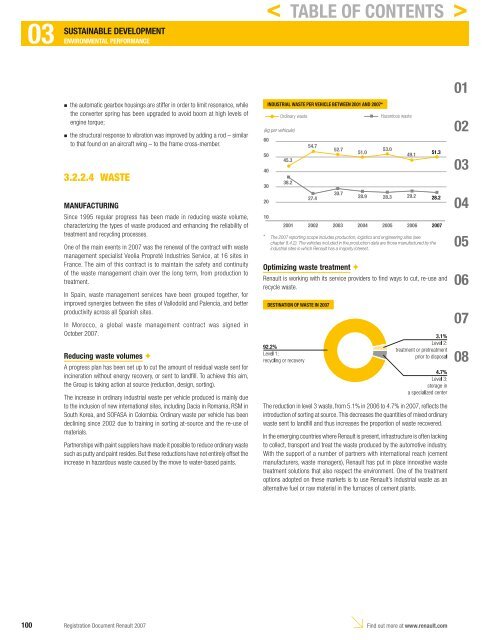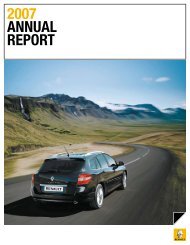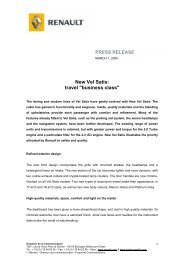2007 Interactive Registration Document - Renault
2007 Interactive Registration Document - Renault
2007 Interactive Registration Document - Renault
Create successful ePaper yourself
Turn your PDF publications into a flip-book with our unique Google optimized e-Paper software.
03 ENVIRONMENTAL<br />
SUSTAINABLE DEVELOPMENT<br />
PERFORMANCE<br />
n<br />
n<br />
the automatic gearbox housings are stiffer in order to limit resonance, while<br />
the converter spring has been upgraded to avoid boom at high levels of<br />
engine torque;<br />
the structural response to vibration was improved by adding a rod – similar<br />
to that found on an aircraft wing – to the frame cross-member.<br />
3.2.2.4 WASTE<br />
MANUFACTURING<br />
Since 1995 regular progress has been made in reducing waste volume,<br />
characterizing the types of waste produced and enhancing the reliability of<br />
treatment and recycling processes.<br />
One of the main events in <strong>2007</strong> was the renewal of the contract with waste<br />
management specialist Veolia Propreté Industries Service, at 16 sites in<br />
France. The aim of this contract is to maintain the safety and continuity<br />
of the waste management chain over the long term, from production to<br />
treatment.<br />
In Spain, waste management services have been grouped together, for<br />
improved synergies between the sites of Vallodolid and Palencia, and better<br />
productivity across all Spanish sites.<br />
In Morocco, a global waste management contract was signed in<br />
October <strong>2007</strong>.<br />
Reducing waste volumes ✦<br />
A progress plan has been set up to cut the amount of residual waste sent for<br />
incineration without energy recovery, or sent to landfi ll. To achieve this aim,<br />
the Group is taking action at source (reduction, design, sorting).<br />
The increase in ordinary industrial waste per vehicle produced is mainly due<br />
to the inclusion of new international sites, including Dacia in Romania, RSM in<br />
South Korea, and SOFASA in Colombia. Ordinary waste per vehicle has been<br />
declining since 2002 due to training in sorting at-source and the re-use of<br />
materials.<br />
Partnerships with paint suppliers have made it possible to reduce ordinary waste<br />
such as putty and paint resides. But these reductions have not entirely offset the<br />
increase in hazardous waste caused by the move to water-based paints.<br />
INDUSTRIAL WASTE PER VEHICLE BETWEEN 2001 AND <strong>2007</strong>*<br />
100 <strong>Registration</strong> <strong>Document</strong> <strong>Renault</strong> <strong>2007</strong><br />
Find out more at www.renault.com<br />
60<br />
50<br />
40<br />
30<br />
20<br />
10<br />
< TABLE OF CONTENTS ><br />
(kg per vehicule)<br />
Ordinary waste Hazardous waste<br />
45.3<br />
38.2<br />
2001<br />
54.7<br />
27.4<br />
2002<br />
52.7<br />
30.7<br />
2003<br />
51.0<br />
28.9<br />
2004<br />
53.0<br />
28.3<br />
2005<br />
49.1<br />
29.2<br />
2006<br />
* The <strong>2007</strong> reporting scope includes production, logistics and engineering sites (see<br />
c hapter 8.4.2). The vehicles included in the production data are those manufactured by the<br />
industrial sites in which <strong>Renault</strong> has a majority interest.<br />
51.3<br />
28.2<br />
<strong>2007</strong><br />
Optimizing waste treatment ✦<br />
<strong>Renault</strong> is working with its service providers to fi nd ways to cut, re-use and<br />
recycle waste.<br />
DESTINATION OF WASTE IN <strong>2007</strong><br />
The reduction in level 3 waste, from 5.1% in 2006 to 4.7% in <strong>2007</strong>, refl ects the<br />
introduction of sorting at source. This decreases the quantities of mixed ordinary<br />
waste sent to landfi ll and thus increases the proportion of waste recovered.<br />
In the emerging countries where <strong>Renault</strong> is present, infrastructure is often lacking<br />
to collect, transport and treat the waste produced by the automotive industry.<br />
With the support of a number of partners with international reach (cement<br />
manufacturers, waste managers), <strong>Renault</strong> has put in place innovative waste<br />
treatment solutions that also respect the environment. One of the treatment<br />
options adopted on these markets is to use <strong>Renault</strong>’s industrial waste as an<br />
alternative fuel or raw material in the furnaces of cement plants.<br />
01<br />
02<br />
03<br />
04<br />
05<br />
06<br />
07<br />
08




